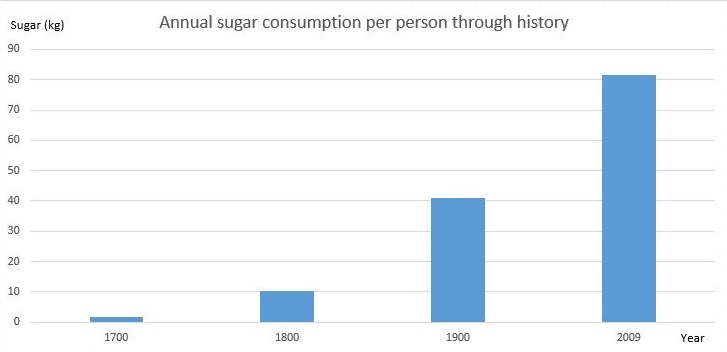Science shows us that sugar acts as an addictive substance that is toxic to our bodies in large amounts. It not only drives obesity and the diseases and disorders caused by being overweight, it also disrupts the endocrine system, unbalances hormone levels, and makes it nearly impossible for
the body to use the fuel it's evolved to use: fat. Plenty of studies back these observations up, but an interesting additional piece of data appears when we look at sugar consumption throughout history.
For millions of years, humans and our ancestors ate a diet primarily composed of hunted meat. That is, fat and protein formed the basis of the diet. Eventually, farming techniques allowed humans to get calories more reliably and to live more easily in regions they couldn't survive in before, but adding vegetables to the diet did not alter the balance of macronutrients humans consumed as drastically as would happen later. Agriculture led to more calories in the diet from some starchy vegetables, but sugars, especially refined and concentrated sugars were still relatively unavailable. Even 100 years ago, sugar formed only a tiny part of the human diet. Even the sweetest fruits were only available seasonally and sugar cane was virtually unknown until it was introduced to the ideal climate of the Caribbean around 1647.
As DivineEatingOut.com explains,
Initially during its mass production, sugar was believed to be beneficial to health, and was only available to the elite classes who could afford it. Sugar and Sweetener Guide explains, “By 1700 average consumption of sugar in the developed world was approximately 4 pounds per annum and this accounted for less than 1 per cent of calorie intake. By 1800 this had risen to approximately 18 pounds and by 1900 it was 60 pounds.” However, it wasn’t long after its popularisation that experts began to question the value of sugar for human health.
Human ingenuity is a fantastically powerful force. With the high demand of consumer craving driving the sugar industry, we have become incredibly effective at producing and refining sugar and at finding new ways to consume even more of it. Nutritionist Lisa Kilgour has written that the urge to consume sugar is a “craving you can't always trust. A sugar craving is usually due to an imbalance in your gut bacteria or a sign of a blood sugar crash.”

The chart above shows the Annual sugar consumption per person through history since 1700. You can see the surge from 4.9 grams per person, per day, on average in 1700 to 227 grams/day by 2009! That works out to nearly 2 tons of sugar per American over a lifetime and the surge on the graph also correlates with the modern rise in the rate of diabetes, heart disease, cancer and a host of other ailments directly connected to sugar consumption.
Read more at DivineEatingOut.com
Hit Your Fat Burning Reboot Switch
Discover how to activate your body's “Reboot Switch” that flips on a fat burning inferno so you can finally achieve your weight loss goals!
Tired, Sleep Problems & Excess Fat?
There are 4 secrets being kept from you about why a modern diet is making us fatter, more tired & sick.
Discover how to activate your body's “Reboot Switch” that flips on a fat burning inferno so you can finally get healthy and achieve your weight loss goals!

